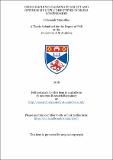Using machine learning to select and optimise multiple objectives in media compression
Abstract
The growing complexity of emerging image and video compression standards
means additional demands on computational time and energy resources in a variety
of environments. Additionally, the steady increase in sensor resolution, display
resolution, and the demand for increasingly high-quality media in consumer and
professional applications also mean that there is an increasing quantity of media
being compressed.
This work focuses on a methodology for improving and understanding the quality
of media compression algorithms using an empirical approach. Consequently, the
outcomes of this research can be deployed on existing standard compression algorithms,
but are also likely to be applicable to future standards without substantial
redevelopment, increasing productivity and decreasing time-to-market.
Using machine learning techniques, this thesis proposes a means of using past
information about how images and videos are compressed in terms of content, and
leveraging this information to guide and improve industry standard media compressors
in order to achieve the desired outcome in a time and energy e cient way.
The methodology is implemented and evaluated on JPEG, WebP and x265
codecs, allowing the system to automatically target multiple performance characteristics
like le size, image quality, compression time and e ciency, based on user
preferences. Compared to previous work, this system is able to achieve a prediction
error three times smaller for quality and size for JPEG, and a speed up of
compression of four times for WebP, targeting the same objectives. For x265 video
compression, the system allows multiple objectives to be considered simultaneously,
allowing speedier encoding for similar levels of quality.
Type
Thesis, PhD Doctor of Philosophy
Collections
Items in the St Andrews Research Repository are protected by copyright, with all rights reserved, unless otherwise indicated.

